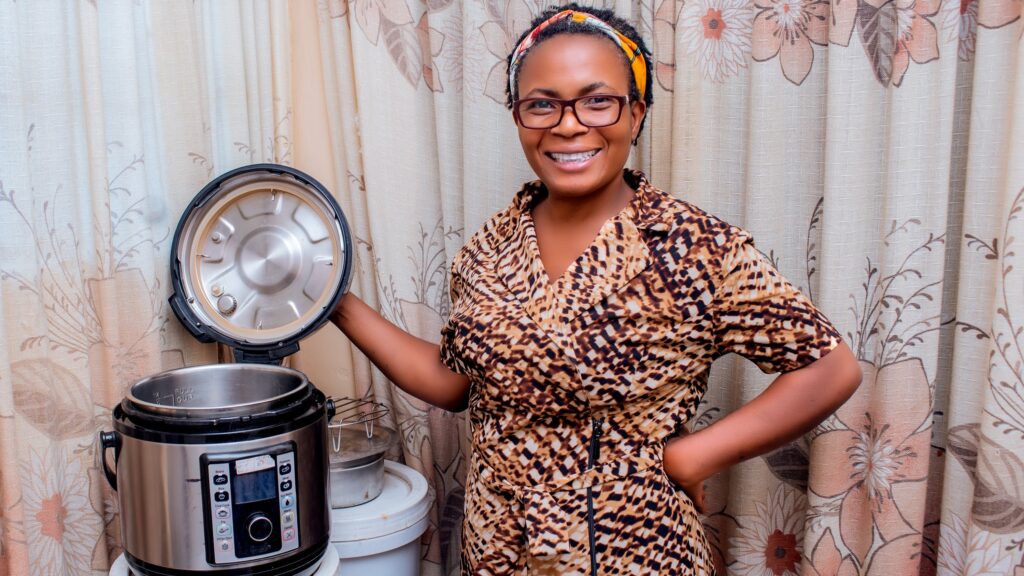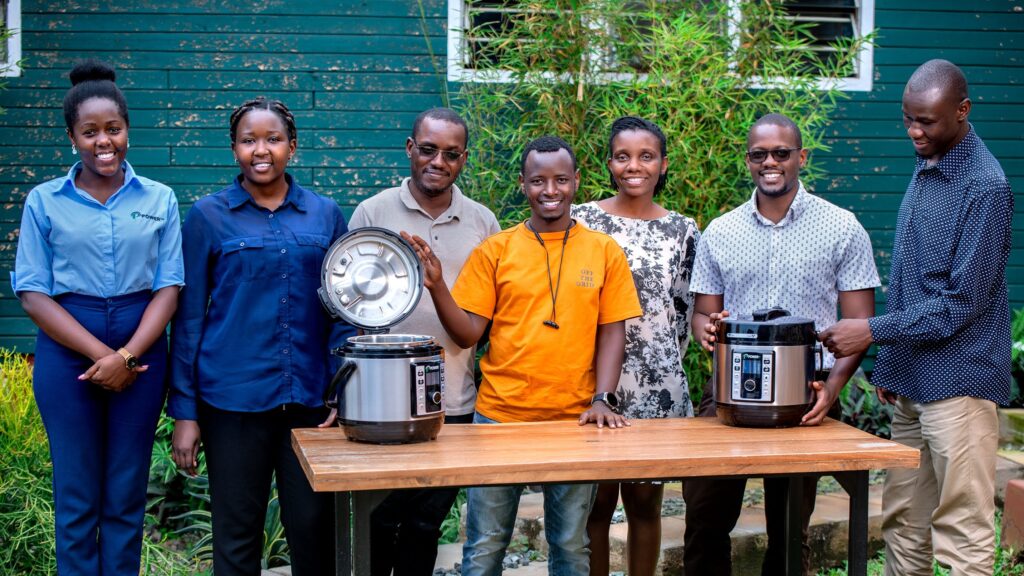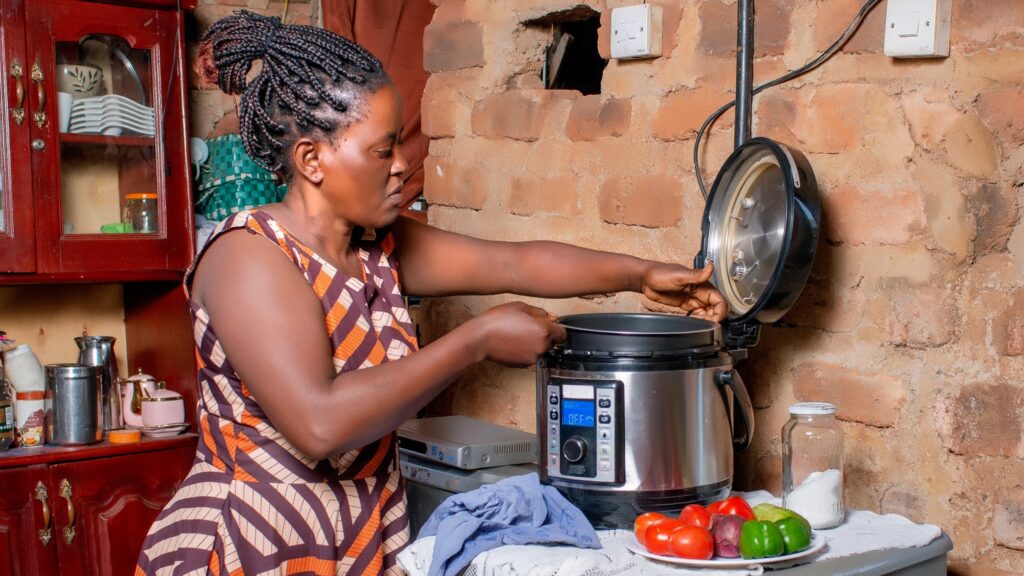PowerUP: Scaling Clean Cooking Through Carbon Markets
PowerUP is a clean-tech start-up based in Uganda. It uses carbon finance to deliver affordable, tech-enabled electric cookstoves to customers in low- and middle-income countries.
CCA spoke with Kato Kibuka, CEO of PowerUP, about the organization’s efforts to leverage carbon markets for clean cooking and aspirations to scale electric cooking across Africa.
This interview is part of a series of conversations CCA is having with business leaders across the clean cooking sector.
Clean Cooking Alliance (CCA): Can you tell us about your company’s products and services?
Kato Kibuka (Kibuka): PowerUP offers a suite of products and services to scale and normalize electric cooking across Africa. We sell an electric pressure cooker (EPC) with integrated pay-as-you-go (PAYG) and energy metering technology. We provide a data platform to analyze cooking usage, which is important in helping distributors understand how the product is being used and how to support the customer with the transition [to this new technology]. Beyond selling e-cookers, you need to make sure they are actually being used and creating an impact for both the end user and their environment. On the services side, we will offer distributors access to the carbon markets by using our program of carbon projects.
When we combine our products and services, we can get the right type of product into the market and provide access to carbon finance to make it viable from an economic point of view. This allows us to scale.
CCA: What are the defining characteristics of your customers?
Kibuka: Our customer is typically an urban or peri-urban household that’s spending a significant part of their energy costs on charcoal, usually purchasing fuel multiple times a week, if not every day. Africa is urbanizing rapidly and the main source of cooking fuel in these areas is still charcoal. These urban families usually don’t have a good alternative cooking fuel that is cheaper and more convenient.
We are targeting households that have three or more people above the age of 10 years old. Our research has shown this profile of homes benefits the most from our e-cookstoves when it comes to energy savings.
To serve this customer, we leverage existing distribution networks to reach as many markets as possible and maximize our impact. We have been targeting distributors who are strong at last-mile distribution, PAYG, consumer financing, recordkeeping, and after-sales services. When the product is delivered to the end users, we need to make sure the utilization is being tracked to ensure customers are truly benefitting from the technology.
CCA: What makes PowerUP different from others in the clean cooking ecosystem?
Kibuka: Electric cooking is our primary focus. We are really looking to bring product innovation from metering, the Internet of Things, the data platform, and digital measurement, reporting, and verification. We are also innovating in terms of our ability to reach new markets through a distributor partnership network. We facilitate access to carbon markets through revenue share-sharing to provide carbon-financed subsidies to our distributors and have a revenue share based on their performance – without us having to set up distribution in every market.
Another thing that differentiates PowerUP is that we do all the design work locally, so we are close to the customer as we design the product (the cooker and software). We have a dedicated research team that examines each country and figures out how to introduce electric cooking in this context, and we provide that research to distributors.
Our focus is not just on deploying products. We invested heavily to make sure the products are being used extensively in the home.
CCA: Where does PowerUP operate?
Kibuka: We are based in Uganda, but we are a global company, so we sell to distributors across all markets. Right now, we have our products in Uganda, Kenya, Tanzania, and Zambia. West Africa is next.
CCA: What do you see as the potential for electric cooking in Uganda and across Africa more broadly?
Kibuka: Electric cooking has huge potential. We know it’s not going to be as widely adopted as biomass cooking, but we also know that the potential for growth is tremendous, particularly in urban and peri-urban areas. This growth is being driven primarily by mass electrification and by the increasing cost of biomass, particularly charcoal, in African urban areas. It also relates to unstable liquified petroleum gas (LPG) prices and governments’ waning interest in continuing to subsidize those fuels. Our bet is on a fuel that comes directly to someone’s home with minimal transportation costs. Our goal is to make sure that, in the next few years, one percent of African households – 12 million beneficiaries – are cooking with electricity.
CCA: Can you walk us through the customer experience for someone using one of PowerUP’s PAYG-enabled electric cookstoves with built-in metering?
Kibuka: No one just comes to us and says, “I want to buy your product.” But they can be convinced quickly. When a sales agent is pitching an EPC to a customer and they say, “this is cheaper than charcoal,” people don’t believe it. In the demonstration, potential customers will go through how to use the product and see the energy meter that’s built in, which allows them to see how much electricity is needed for cooking. When the customer is shown the savings, that’s when the lightbulb moment happens.
After buying an EPC, the first two weeks are typically quite intensive, with phone calls and follow-ups to make sure the customer knows how to use the product. Customers get a localized cookbook, and any challenges they have can be resolved over the phone. Our goal for the first week is to prove it’s much faster and cheaper than cooking with biomass or LPG. We also stress convenience, so you don’t have to babysit the food; speed, especially for working families in urban areas; and daily energy cost savings. We’ve seen through pilots that is the best use of marketing.
CCA: How are you planning to leverage the carbon finance opportunity for clean cooking?
Kibuka: PowerUP is using the carbon markets to scale electric cooking. We are building a multi-country carbon program that uses the latest cookstove metering methodology to issue credits. We will work with distribution partners to offer them access to the carbon program in combination with our products.
Carbon financing will pay for subsidies to reduce the upfront costs of acquiring the cookers. It will also be used to pay for the expense of managing digitalization of the monitoring, reporting, and verification. This data is crucial for building trust with carbon buyers.
Carbon revenue is an important, supplementary, income stream for last-mile distributors. It also incentivizes them to sell the product properly, train the end user, collect usage data, and provide after-sales services.
Most importantly, without any type of price reduction, electric cooking will not scale. Some sort of subsidy or combination of subsidies are needed to get enough volume that the business model can sustain itself. We believe the carbon markets will bring the capital and commercial viability to achieve our business vision of making our solutions more affordable and reaching more people.
CCA: How do you see your business developing over the next 5-10 years?
Kibuka: Right now, we are at a point of introducing our product and getting stoves out with the early adopter distributors, showing that you can sell these units.
When you look five years out, it’s more about how to transition tens of millions of people to electric cooking and make it a normal part of their energy stack, the way people see charcoal.
Five to ten years from now, we will actually be receiving a significant amount of money from carbon revenues. We’ll have economies of scale and be able to introduce the product at a much cheaper price than what we’re doing now out of the factory.
The goal is to get to a point where people in urban and electrified areas have no reason to cook with biomass.
CCA: How do you see the clean cooking sector developing more broadly?
Kibuka: From a carbon point of view, the clean cooking sector is going to change dramatically. I think there’s going to be a huge push for digitization to make sure there’s a way to track that stoves are being deployed, used, and creating impact.
I think the sector is going to benefit from governments getting a lot more serious about cleaner alternatives for cooking, especially as they need to hit their nationally determined contributions. Governments are likely going to stop subsidizing LPG as much, given the expense, but I think the clean cooking sector will grow significantly because of carbon finance.
I’m optimistic because, if you can make electric cooking and clean cooking in general a commercially viable business, people will invest a lot more in it, and you will have a lot more impact.
CCA: Do you have any advice for other companies developing clean cooking technologies and business models about getting to scale?
Kibuka: It’s about getting product to market, having a high value proposition that’s clear to end users, and reaching large volumes through strong distribution. Getting to scale quickly will allow you to bring down your manufacturing costs and prove viability.
CCA: Is there anything else about PowerUP’s work that you want to share with our readers?
Kibuka: Electric really is where everyone needs to be in terms of cooking. We know that the masses will be on a variety of fuel stacks, but we need to work on the end solution now to create a path for scalability. Electric is the cheapest way of cooking; it’s the fastest; it’s convenient; it’s safe; it has the biggest value; it has the biggest impact for the users; and it has the biggest impact on the environment, assuming that the production of the electricity is clean.
We’re betting big on electric cooking.



